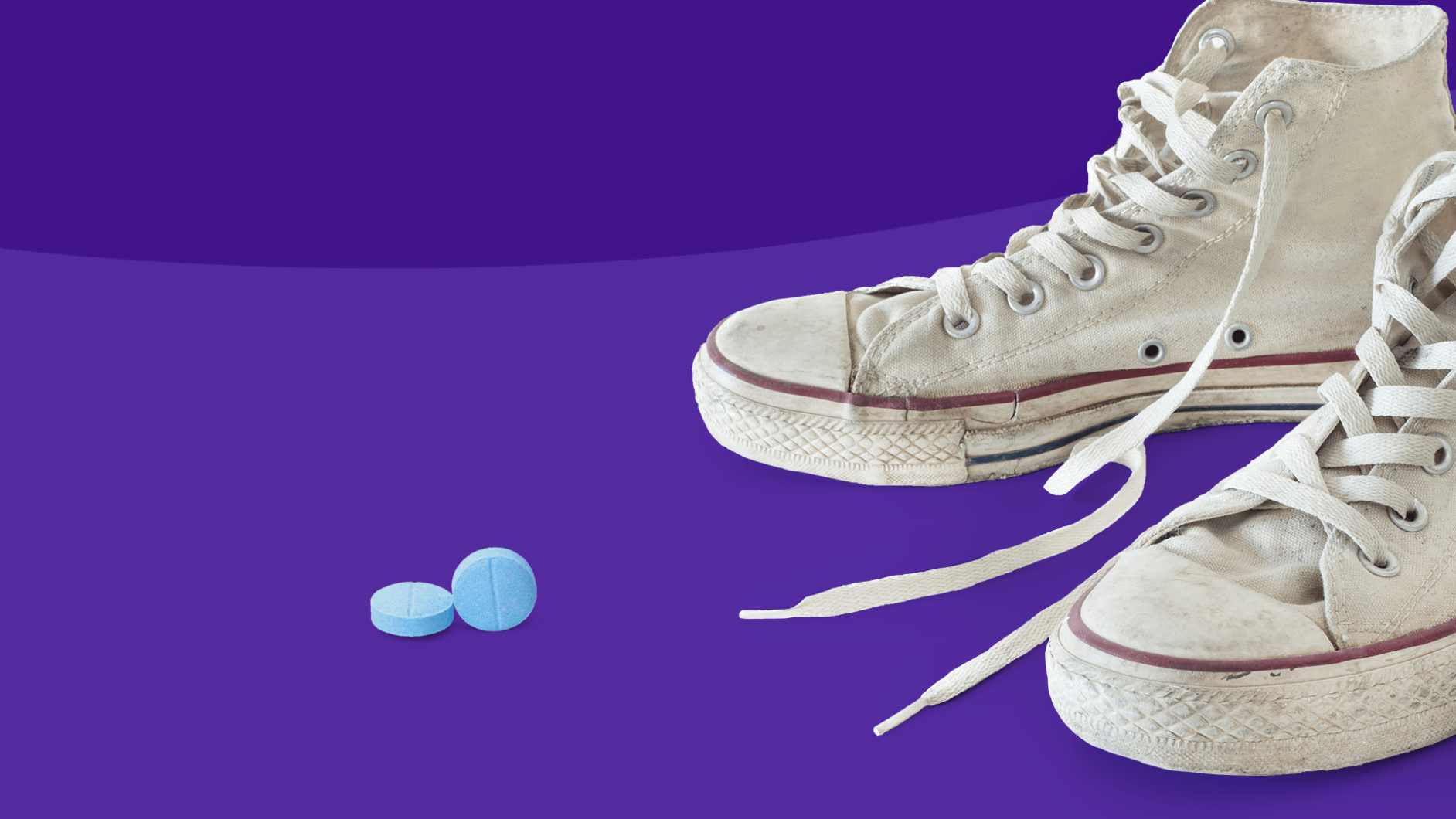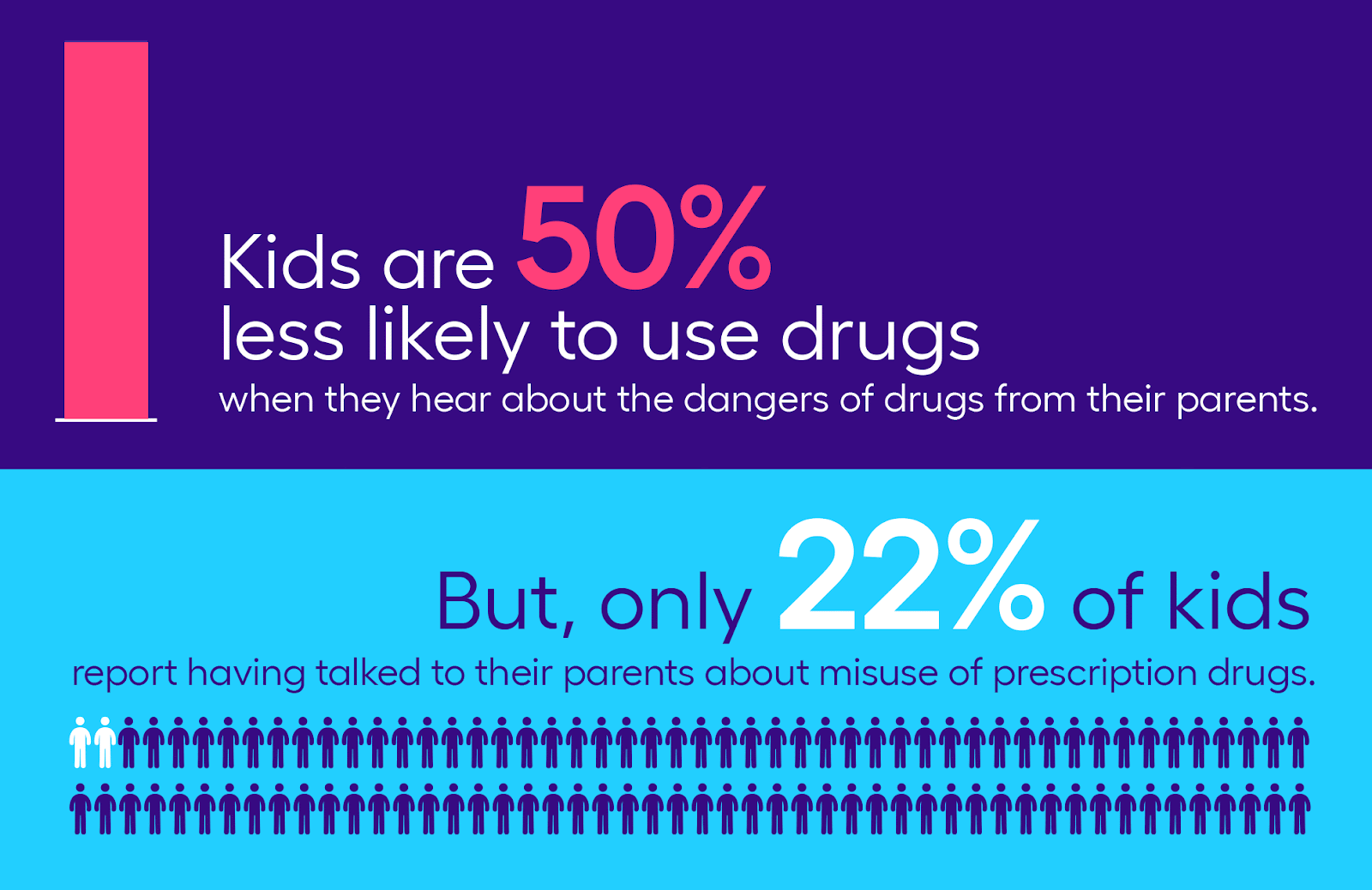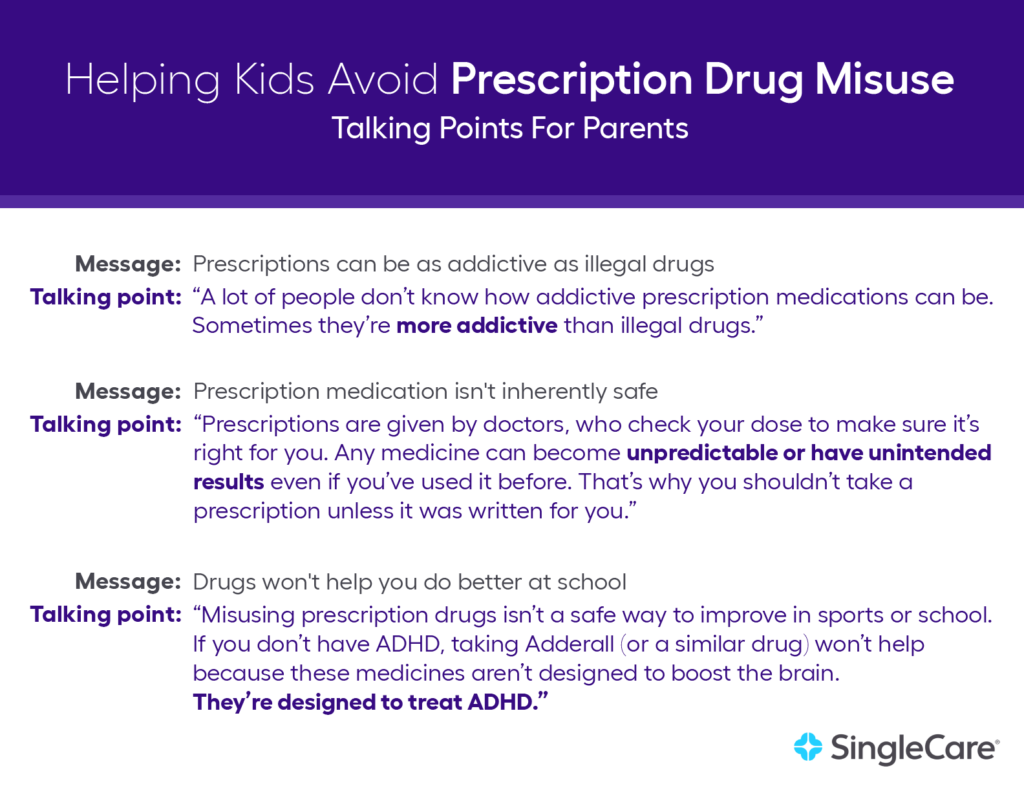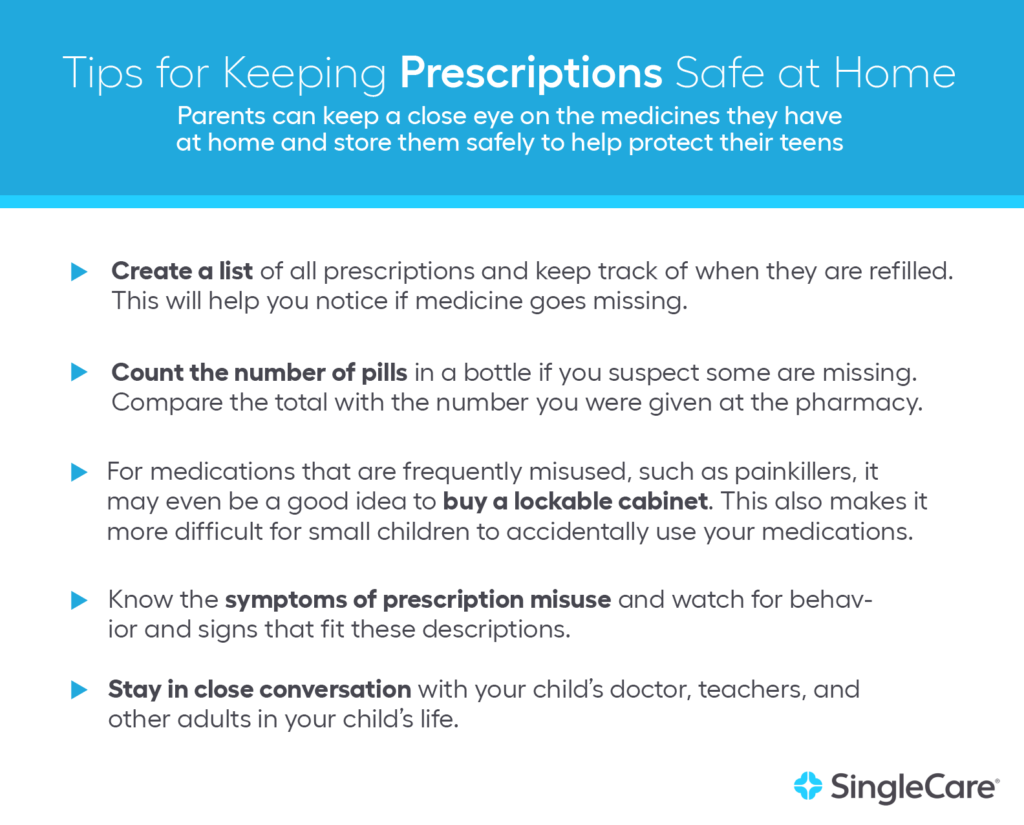Key takeaways
Teens are 50% less likely to misuse drugs when their parents talk to them about the dangers of drug use.
Prescription drug misuse is defined as using a substance outside legal or medical guidelines, with opioids (such as OxyContin), stimulants (like Adderall or Ritalin), and depressants (such as Xanax) being the most commonly misused by teens.
Signs of prescription drug misuse in teens include changes in behavior, physical symptoms like sleep or appetite changes, and mental symptoms such as extreme mood swings.
Preventing teen prescription misuse involves parents keeping open communication, monitoring prescriptions at home, and setting a positive example of medication use.
Parents are often looking for hidden dangers in their teens’ lives, and prescription drug misuse is one thing that can easily fly under the parental radar.
Why is it a risk? For one, prescription medications are accessible and widely distributed, making it easier than ever for an unauthorized person to get their hands on them. Some of these medications may have been prescribed to a teen or another person at home. In some cases, however, teens may start to misuse their prescriptions or those of a family member or friend. Having a prescription for a medication may seem less suspicious than having an illicit, illegal drug, which can make it easier for teens to keep misuse hidden.
How can parents keep kids safe in light of the growing prescription misuse trend? This guide will give you a starting point for new conversations with your teen, ideas for further research, and tips on how to keep your children safe from prescription misuse.
What is prescription drug misuse?
The World Health Organization (WHO) defines drug misuse as “the use of a substance for a purpose not consistent with legal or medical guidelines.”
According to the Drug Enforcement Agency (DEA), prescription medications are commonly misused by teens, following marijuana, synthetic marijuana, and alcohol as the top substances for this age group.
Prescription drug misuse accounts for more than 35% of opioid drug overdose deaths in the U.S., and most of the teens who misuse drugs get them free from people they know rather than buying them illegally.
Most commonly misused prescriptions
While any drug has the potential for misuse, the DEA shares that most fall into these three categories:
- Opioids, such as OxyContin, which are prescribed to treat pain
- Stimulants, such as Adderall or Ritalin, which are used to treat attention deficit hyperactivity disorder (ADHD)
- Depressants, such as Xanax and other members of the benzodiazepine family, which are used as a sleep aid or to treat anxiety
The dangers of misusing prescriptions and over-the-counter medications
All medications are drugs and therefore have the risk of causing harm to those who take them, even when carefully prescribed and taken as directed. This is why patients taking controlled prescriptions often go through additional checks and oversight by their provider to make sure the continued use is appropriate. Doctors, nurses, and pharmacists work together to check the dosage, monitor the drug effects on the body, and run tests to make sure the medicine isn’t doing damage. If the drug isn’t working as it should, adjustments may be made.
For teens using a prescription they weren’t prescribed, there is no medical supervision being offered by a healthcare provider. They might not take an appropriate dosage or understand the potential for side effects. They don’t have an expert to turn to if something goes wrong.
Prescription drug misuse signs and symptoms
The signs of prescription drug misuse can be subtle. Parents, schoolteachers, and trusted adults may be able to stop prescription drug misuse in teens by knowing the potential signs and physical symptoms. For example, if your child is misusing prescriptions, you may notice changes in their behavior.
Signs
- Avoiding daily activities and responsibilities
- Secretiveness
- Late-night disappearances
- Empty medicine bottles in the trash or prescriptions you don’t recognize
- Extra doctor visits or trips to the pharmacy, early refills for prescribed medications, or lost prescription medicines (which may be an excuse to get additional refills)
Physical symptoms
- Sleep or appetite changes
- Excessive thirst
- Sudden weight loss or weight gain
- Signs of possible withdrawal, such as sweating, feeling clammy, and dilated pupils
Physical symptoms may depend on the drug that was taken:
- Opioid use: Sleepiness, constipation, lack of coordination, slow breathing
- Stimulant use: Insomnia, high blood pressure, irregular heartbeat, high body temperature
- Sedatives and anti-anxiety use: Dizziness, unbalanced or unsteady walking, sleepiness, slowed breathing
Mental symptoms
- Personality changes
- Extreme mood swings
- Atypical behavior
Mental symptoms may depend on the drug that was taken:
- Opioid use: Euphoria or feeling high, mental confusion, changes in pain sensitivity
- Stimulant use: Euphoria, restlessness, overactive mind, paranoia, anxiety, unusual alertness
- Sedatives and anti-anxiety medication use: Reduced concentration, mental confusion, memory problems, slurred speech
Additional considerations
- Every person is different, so your teen may not show all of the signs
- Other symptoms are possible, so watch for anything unusual
- Some teens are able to hide a few or all of their symptoms
- Remember that there could also be a legitimate underlying medical cause unrelated to drug use (for instance, dizziness is also a common sign of having a heart condition)
If you recognize any of these signs and symptoms in your child, it’s important not to panic. This list should be considered a guide and not a definitive diagnosis. Even if your teen is actually misusing drugs, he or she needs you to be a reliable and caring adult presence who can provide the truth about prescription drugs and the potential dangers of prescription drug misuse.
How parents can help prevent teen prescription misuse: Scripts for parents, teachers, and mentors
Teens do listen to adults around them, and you can have an impact—statistics prove it. Kids are 50% less likely to use drugs when their parents regularly discuss the dangers with them. Often, teenagers are more rational than we expect them to be and are receptive to positive influence even if they don’t outwardly show it.
Unfortunately, the evidence suggests many parents aren’t having these conversations with their kids. Only 22% of teens report discussing the dangers of prescription drugs with their parents.
The truth is, young people are watching and listening to what the adults around them say. Because prescription drug use is often an overlooked way to misuse medications, about 1 in 4 teens actually believe their parents wouldn’t be too worried about prescription misuse.
Your most potent weapon against prescription misuse may very well be starting a conversation with your kids.
Scripts for talking about teen prescription misuse
Using situations in daily life to initiate a conversation with your child is one strategy. Here are a few possibilities.
- You or your teen get a prescription
- A kid at school gets in trouble for misusing prescriptions
- Local news reports about prescription drug misuse
As you start talking with your teen about drug misuse, ask them for their opinion on drugs, and weave conversations about healthy prescription drug use into broader conversations about living a healthy lifestyle.
Sharing the facts about school, activities, and drugs
Influential adults can provide education about medications while taking aim at the myths teenagers may believe. Even if teens are concerned about side effects or other risks, they may think the benefits outweigh the risks, probably because they don’t understand the risks.
Parents play an important role in sharing the facts about prescription drugs, and there are a few important ones that kids need to know.
Fact: Prescriptions can be as addictive as illegal drugs
Talking point: “A lot of people don’t know how addictive prescription medications can be. Sometimes they’re more addictive than illegal drugs.”
Illegal drugs aren’t the only act in town when it comes to addiction. Yet 27% of teens think prescriptions aren’t as addictive as street drugs. Sadly, the belief that misusing prescriptions is safer is also shared by 16% of parents.
Fact: Prescription medication isn’t inherently safe
Talking point: “Prescriptions are given by doctors, who check your dose to make sure it’s right for you. Any medicine can become unpredictable or have unintended results even if you’ve used it before. That’s why you shouldn’t take a prescription unless it was written for you.”
With your kids, it’s important to emphasize a medication’s potential to be both beneficial and dangerous. Prescription medicines aren’t necessarily safe for every individual, which is why doctors, healthcare providers, and pharmacists do a full evaluation of patient health histories before dispensing medication.
Even over-the-counter medicines have side effects. Let your teen know that these side effects can be unpredictable and may show up later if they don’t occur after the first dose. Taking medication your body doesn’t need increases the possibility that your body could suffer damage.
Let your teen know about the risks of prescription misuse.
- Irregular heartbeats
- Slowed brain activity and thinking
- Changes in body temperature to risky highs and lows
- Seizures
- Heart, kidney, or liver failure
- Increased likelihood of death or serious injury
- Mental changes
- Missed work, school, and personal activities
Fact: Drugs won’t help you do better at school
Talking point: “Misusing prescription drugs isn’t a safe way to improve in sports or school. If you don’t have ADHD, taking Adderall (or a similar drug) won’t help because these medicines aren’t designed to boost the brain. They’re designed to treat ADHD.”
Not everyone misuses drugs to get high. Even conscientious, hard-working teens may believe there are advantages to unauthorized prescription drug use.
Talking to your kid when you suspect drug misuse
If you suspect your teen is already misusing prescriptions, don’t react without a clear plan. This will help you safely confront your child:
- Wait until the right time. Don’t try to talk to your teen until they’re sober. If they are high, drunk, or otherwise under the influence, wait until later to have a conversation.
- Don’t be vague. Tell your teen exactly why you’re concerned about drug use. Did you find an empty bottle? Did you see him or her taking two pills instead of the one prescribed? Instead of saying, “I know you’re using drugs!” Say, “I’m concerned because I saw you take three pills at the same time, which isn’t safe. Is everything okay?”
- Stay calm. Avoid reacting too strongly and provoking your teen. Remain as calm as you can and stick to the facts. Your teen may be upset and react strongly, but you want to remain in control of your reaction.
- Share your views. Let them know how you feel about drug misuse and remind your teen that you love them and want to be supportive.
- Find help. If you need backup, try talking with a school counselor or nurse about how you can help your teen. In some instances, your teen’s participation in a rehabilitation program may be necessary for a full recovery.
Whenever possible, emphasize the value of living a healthy lifestyle and using medicines responsibly.
Preventing teen prescription misuse: Ideas for mentors and teachers
As a mentor or teacher, you may not be able to directly prevent teen access to prescription drugs at home, but you can emphasize the risks of misusing medications intended for other people.
Some teens may need to hear accurate education about drugs from more than one source and from people besides their own parents. Teachers and mentors can serve as positive, nonparent resources for these kids. In this guide, you’ll find talking points and statistics.
Drug misuse versus drug misuse and addiction
In this guide, we want to draw distinctions between drug misuse and drug addiction and misuse. This is a complex topic, and the reasons for drug misuse can be complex as well, but it’s important to note that there’s a difference between the actions behind using a drug improperly and having a diagnosed addiction.
Prescription misuse, like all drug misuse, may or may not be part of addiction.
- Prescription misuse: Broadly speaking, misuse is using prescription medications outside of their prescribed use. This can include taking someone else’s prescription medicine, intentionally using a dose that’s larger than the prescribing provider’s recommendation, or using your prescription for a purpose not intended by the provider.
- Prescription addiction: A diagnosable, complex disease that impacts the entire body and causes changes inside the brain. Drug addiction is described clinically as Drug Use Disorder (DUD).
If your teen misuses medications, it doesn’t necessarily mean your child meets the medical criteria for addiction. Addiction can only be diagnosed by a healthcare provider after a full examination of the patient’s health profile and experience with the prescription.
Preventing prescription misuse by your teen may help prevent future addiction. What you do today to start a conversation and share information with your child may guide their choices and decision-making for all medications. As they grow into adults, today’s teens will likely see a lot more over-the-counter, prescription, and illegal drugs in the culture around them, so they need you to provide them with information and insight now.
The facts about teen drug misuse
Surveys and cause-of-death reports reveal disturbing facts about the consequences of teen prescription drug misuse, which is up 33% since 2008.
What is the No. 1 drug used by teens?
The Monitoring the Future 2018 Survey, sponsored by The National Institute on Drug misuse, reports that among prescription drugs, 3.5% of teens report using Adderall, 1.7% of teens report using Oxycontin, 1.1% of teens report using Vicodin, and 0.8% of teens report using Ritalin.
Teenage drug statistics
The most reliable source for information about teens and drugs comes from the annual Monitoring the Future (MTF) Survey of U.S. eighth, 10th, and 12th graders. The survey reveals important information about trends in teen drug use. Statistics go back to 1975.
Teenage drug use statistics 2021
According to the 2021 MTF survey, here are the percentages for respondents who reported using the following drugs in the previous year.
- Vaping nicotine: 19.2%
- Marijuana: 17.9%
- Adderall: 1.7%
- Synthetic marijuana: 1.6%
- Oxycontin: 0.9%
- Cocaine: 0.7%
- Vicodin: 0.6%
- Ritalin: 0.5%
- Heroin: 0.2%
Teenage drug use statistics 2020
According to the 2020 MTF survey, here are the percentages for respondents who reported using the following drugs in the previous year.
- Vaping nicotine: 27.1%
- Marijuana: 24.6%
- Adderall: 3.3%
- Synthetic marijuana: 2.2%
- Oxycontin: 1.4%
- Cocaine: 1.4%
- Vicodin: 0.9%
- Ritalin: 1.0%
- Heroin: 0.2%
While drug use has decreased in several areas, the popularity of vaping products and some prescription drugs will continue to challenge parents and healthcare professionals. It is hard to know how much of the downward trend is due to COVID-19 isolations and teens being home more during the 2020-2021 school year.
Tips for keeping prescriptions safe at home
Parents should keep a close eye on the medicines they have at home to help protect their teens.
- Create a list of all prescriptions and keep track of when they are refilled. This will help you notice when medicine goes missing.
- Count the number of pills in a bottle if you suspect some are missing. Compare the total with the number you were given at the pharmacy.
- For medications that are frequently misused, such as painkillers, buy a lockable cabinet.
- Know the symptoms of prescription misuse and watch for behavior and signs that fit these descriptions.
- Stay in close conversation with your teen’s doctor, teachers, and other adults in your child’s life.
Raising teens to use medicines responsibly
As you have these conversations, let your teen know how they can use medicines the right way and stay healthy:
- Following advice and directions: It’s important to follow all warnings, provider advice, and directions included with a prescription. This also includes guidance against taking someone else’s prescription.
- Rejecting damaged or tampered medications: Advise your teen what to do if their medication looks obviously damaged, tampered with, or expired. Let them know they should listen to their common sense and avoid taking any medicine that looks damaged or unsafe without talking to their doctor or pharmacist.
- Storing medicine: Teens should make sure their own prescriptions are stored out of reach and away from younger children. If the packaging provides special storage instructions, it’s important to follow them.
- Talking about unwanted side effects: Side effects should be reported to the prescribing physician or pharmacist. The provider may decide to change the dose or adjust the medication.
- Knowing contraindications and interactions: Prescriptions and over-the-counter medications may interact with each other and with commonly used supplements.
- Reading labels carefully: Teens should know how important it is to read labels and box inserts. These labels contain important information for taking the medication safely.
- Finding trusted online resources: The internet does have some bad information, but trusted sites, such as the Mayo Clinic site, usually provide legitimate health information, including information about prescriptions.
- Asking questions: Kids should be encouraged to talk with their pharmacist and healthcare provider if they have prescription questions.
By teaching your teen how to use medicines properly, you’re setting up a healthy view of prescriptions and other drugs for the rest of their life.
Setting a good example for your kids’ prescription drug use
The statistics further support that parent attitudes matter. In fact, while 1 in 4 teens claim to have misused prescriptions at least once in their lives, the same number claim that parents don’t care as much about prescription misuse as they do illegal drug use. This belief could make teens think it’s not really a big deal for them or their parents. One-third also think that it’s acceptable to use prescriptions that weren’t prescribed to them to self-treat pain or an illness.
The same study found that nearly one-third of parents believe that prescription stimulants, such as Adderall or Ritalin, can help teens’ performance even if they don’t have attention disorders. Myths like these can be dangerous—especially if teens hear them from their parents. Parents can help dispel them by having open and honest conversations with teens about prescription drugs, setting expectations that teens only take medications prescribed to them, and acting as role models for healthy prescription use.






